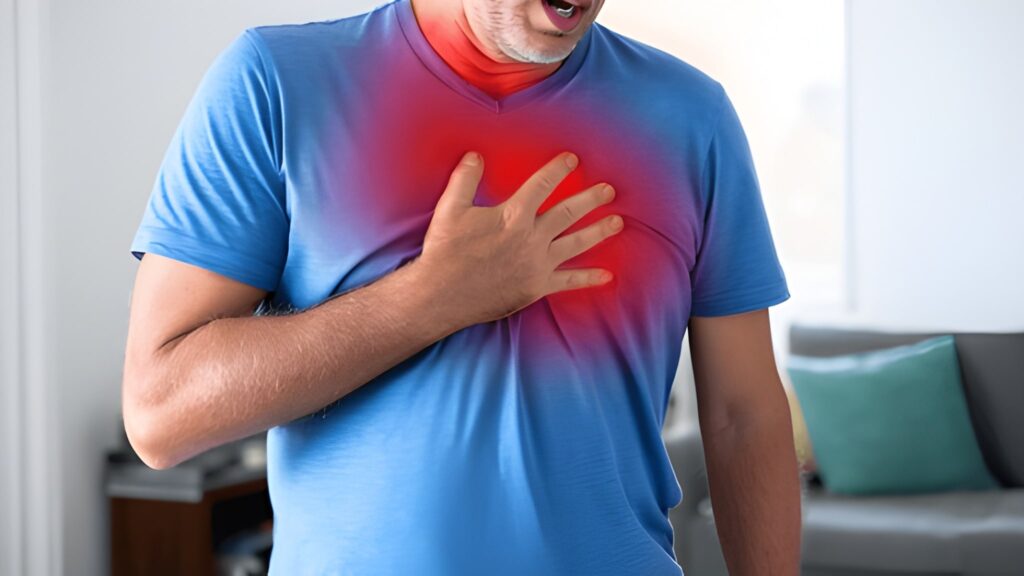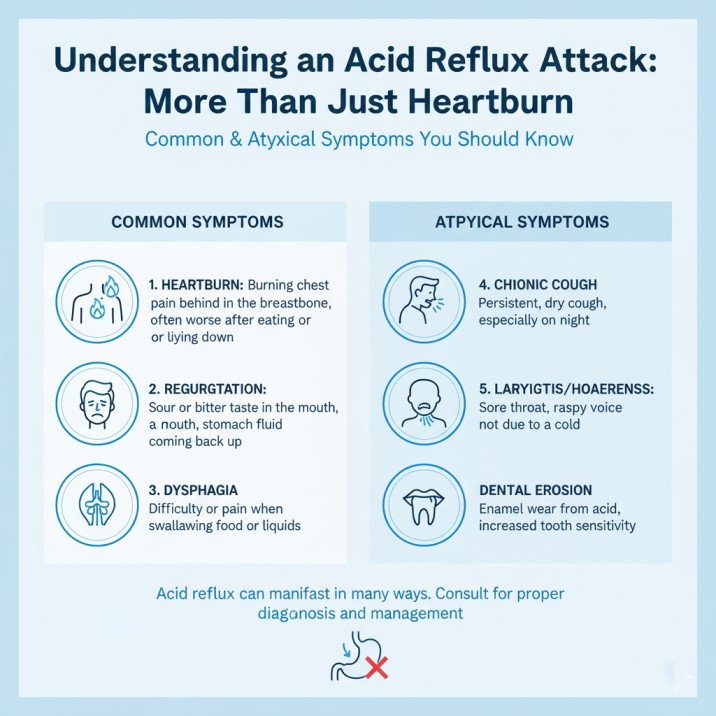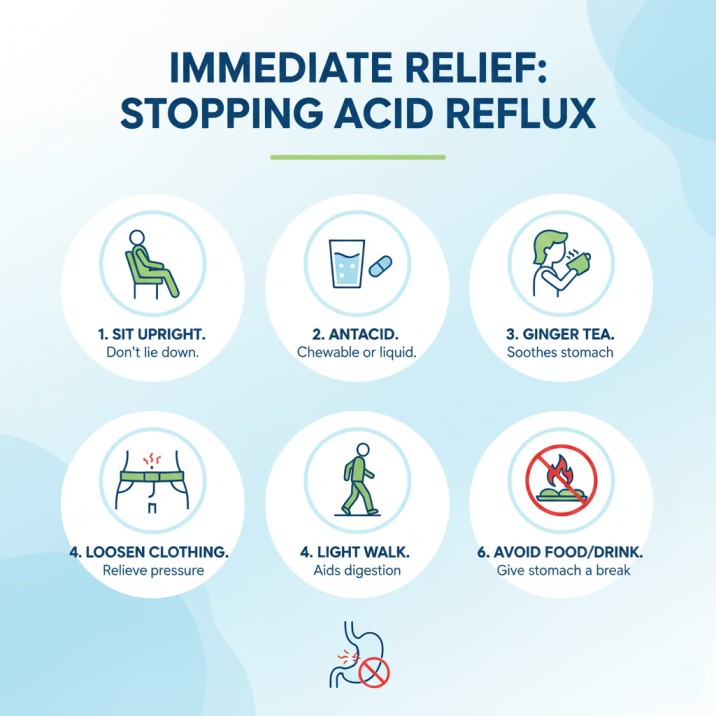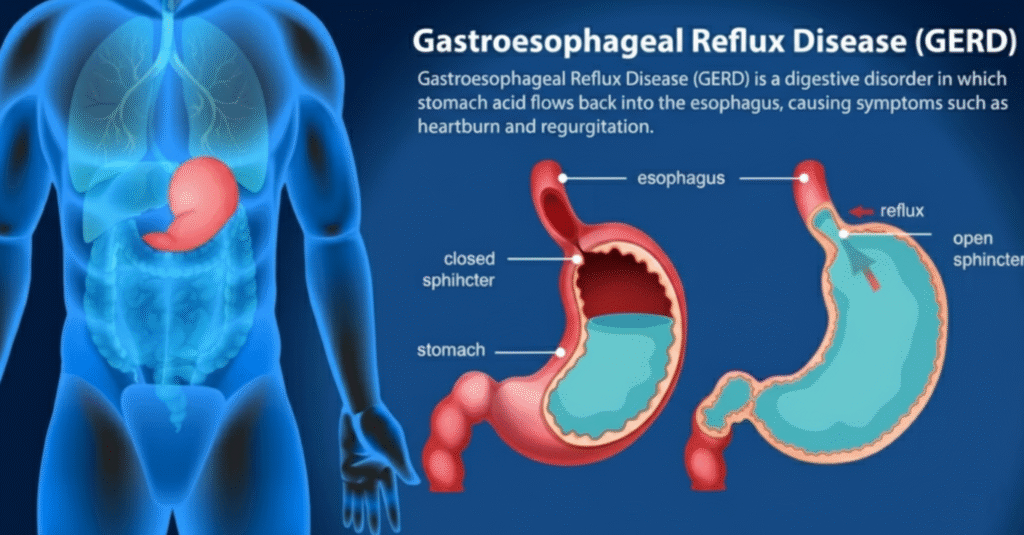What to Do During an Acid Reflux Attack?

A sudden, sharp, and intense burning sensation in your chest, a sour taste in your mouth, or a feeling of food coming back up—this is an acid reflux attack. It can be an alarming and uncomfortable experience that makes you immediately reach for your phone to search for an answer. This guide is designed to provide you with a clear, actionable plan to not only manage an attack but also to understand and prevent them in the future. This information is backed by the extensive professional expertise of Dr. Samir Rahmani, a highly reputable UK-trained consultant general and laparoscopic surgeon with over 25 years of experience in gastrointestinal and bariatric surgery. Dr. Rahmani has performed over 5,000 procedures and holds a Medical Doctorate in Surgery from the University of Leeds.
Understanding an Acid Reflux Attack: More Than Just Heartburn
Before diving into solutions, it’s important to know what you’re dealing with. An acid reflux attack is caused by the backflow of stomach acid into the esophagus, the tube connecting your mouth to your stomach. While occasional acid reflux is common, an “attack” is typically more severe, causing significant discomfort and distress. The primary symptoms of an acid reflux attack include a sharp, burning pain, a sensation of pressure in the chest, or the regurgitation of food or sour liquid. Knowing these symptoms helps you recognize the problem and take swift action.
Read – Heartburn, Acid Reflux, or GERD: What’s the Difference?

Immediate Steps to Stop an Acid Reflux Attack Immediately
When an attack hits, you need a quick and effective solution. These are the first-aid steps recommended by Dr. Samir Rahmani to provide fast relief. The goal is to get the acid back down and out of your esophagus as quickly as possible.
- Sit or Stand Upright. The very first thing you should do is stand up straight or sit upright. Gravity is your best friend during an acid reflux attack. Lying down allows stomach acid to flow back up easily, making the attack worse. This is a simple but powerful action that can provide near-instant relief.
- Loosen Any Tight Clothing. Anything that puts pressure on your stomach can force acid up into your esophagus. Loosen your belt, the top button of your pants, or any other restrictive clothing to alleviate this pressure.
- Take Small Sips of Water. A few sips of plain, non-carbonated water can help in two ways: it dilutes the stomach acid and helps to wash it back down into the stomach. Make sure you sip slowly to avoid introducing air, which can add to the problem.
- Use an Over-the-Counter Antacid. Antacids like calcium carbonate (Tums) or magnesium hydroxide (Rolaids) work by neutralizing stomach acid. They offer a very rapid solution to the discomfort. These are what to take for acid reflux at the moment. Always follow the instructions on the package.

Specialized Relief: What to Do During an Acid Reflux Attack at Night
An acid reflux attack at night is a uniquely frustrating and often painful experience. It can interrupt your sleep and cause severe discomfort, including night heartburn and regurgitation at night. Many people ask, “why is acid reflux worse at night?” The answer lies in your anatomy and a lack of gravity. When you lie flat, there’s no force pulling the acid down. Additionally, saliva production, which helps neutralize stomach acid, decreases while you sleep.
For a nighttime attack, here are some key strategies for relief and prevention:
- Elevate Your Head and Upper Body. This is a non-negotiable step for nighttime relief. Use a wedge pillow or elevate the head of your bed by 6-8 inches. This keeps your esophagus above your stomach, making it much harder for acid to flow upward. This simple act can be a game-changer for how to prevent acid reflux at night.
- Avoid Lying Down After Eating. Try to finish your last meal or snack at least two to three hours before going to bed. This gives your stomach time to empty and reduces the amount of acid available to come back up.
- Chew Sugar-Free Gum. A great home remedy for acid reflux at night is chewing gum. It increases saliva, which helps to wash stomach acid back down and neutralize it.
- Sip on Calming Teas. Chamomile tea or ginger tea can have a soothing effect. Ginger, in particular, has natural anti-inflammatory properties that can help calm the stomach.
Beyond the Attack: Long-Term Prevention Strategies
Managing an acid reflux attack is only half the battle. True relief comes from preventing them from happening in the first place. This is where a proactive approach is crucial, and it’s a core part of Dr. Rahmani’s guidance. By making sustainable lifestyle changes, you can significantly reduce the frequency and severity of your attacks. The goal is to stop acid reflux at night for good.
- Identify and Avoid Trigger Foods. Common culprits include spicy foods, fatty or fried foods, citrus fruits, tomatoes, onions, garlic, chocolate, coffee, and alcohol. Keep a food journal to help you pinpoint exactly what triggers your attacks.

- Eat Smaller, More Frequent Meals. Large meals fill your stomach and put pressure on the lower esophageal sphincter, the valve that keeps acid in your stomach. Eating smaller portions throughout the day can prevent this.
- Maintain a Healthy Weight. Excess weight, especially around the abdomen, increases pressure on your stomach. Losing even a few pounds can make a significant difference in alleviating gerd symptoms at night and during the day.
- Quit Smoking. Smoking weakens the lower esophageal sphincter, making it easier for acid to travel up the esophagus.
- Manage Stress. Stress can increase stomach acid production and worsen symptoms. Incorporate stress-reducing activities like meditation, yoga, or deep breathing exercises into your routine.
Natural Remedies and Lifestyle Hacks: How to Treat Acid Reflux at Night
In addition to the immediate and long-term strategies, there are several natural approaches and lifestyle hacks that can provide daily relief and help how to treat acid reflux at night.
- Baking Soda Solution. A simple and effective remedy for acid reflux at night is a teaspoon of baking soda mixed into a glass of water. It helps neutralize stomach acid, but this should be a temporary solution, not a daily habit, due to its high sodium content.
- Apple Cider Vinegar. While it sounds counterintuitive, some people find that a small amount of apple cider vinegar (1-2 teaspoons) mixed with water before meals can help. The theory is that it aids digestion, but this is a personal remedy and may not work for everyone.
- Wear Loose-Fitting Clothes. This is a simple but effective preventive measure, as it avoids putting unnecessary pressure on your abdomen.
- Elevate your mattress. Physically raising the head of your bed on blocks, not just with pillows, is an effective way to get rid of heartburn fast at night and prevent it from recurring.
When to Seek Professional Medical Care
While this guide offers a wealth of information, some symptoms should never be ignored. It’s crucial to understand that acid reflux can sometimes mimic the signs of more serious conditions. Dr. Samir Rahmani stresses the importance of seeking a professional medical opinion for:
- Severe chest pain that radiates to your arm, neck, or jaw, especially if accompanied by shortness of breath. This could be a heart attack, and you should seek emergency care immediately.
- Acid reflux choking at night or a feeling of something being stuck in your throat, which could be a sign of significant esophageal damage.
- Regurgitation that is severe or occurs very frequently.
- Vomiting blood or black, tarry stools, which indicate internal bleeding.
- Persistent or worsening symptoms despite trying lifestyle changes and over-the-counter medications. This could be a sign of a more serious condition like GERD, for which a diagnosis and treatment plan from a professional like Dr. Rahmani is essential.
Conclusion: Take Action and Protect Your Digestive Health
Acid reflux attacks are distressing but highly manageable with the right information and steps. By following simple, actionable advice—sit upright, drink water, avoid triggers, take antacids, and practice relaxation, you can quickly alleviate discomfort. Long-term prevention comes from lifestyle changes, understanding personal triggers, and having a plan for emergencies.
For persistent, severe, or confusing symptoms, trust the expertise of Dr. Samir Rahmani. As a globally recognized consultant surgeon, Dr. Rahmani brings world-class care and advanced treatment options for acid reflux and digestive disorders in Dubai and beyond.
Frequently Asked Questions (FAQs) About GERD Chest Pain
A: The most common symptoms of an acid reflux attack include a burning sensation in the chest (heartburn), a sour taste in the back of the throat due to regurgitation of food or acid, and a feeling of a lump in your throat. You may also experience belching, bloating, or nausea.
A: Yes, a popular remedy for acid reflux at night is to sip on chamomile or ginger tea. Another option is chewing a piece of sugar-free gum, which increases saliva production to help neutralize the acid in your esophagus.
A: To how to stop an acid reflux attack, your first steps should be to sit upright to let gravity work, loosen any tight clothing, and take a quick-acting antacid if you have one available.
A: The quickest way to get relief from heartburn fast at night is to take a liquid antacid. If you don’t have one, try sipping on a small amount of warm water or chewing gum. Elevating your head with a pillow can also help provide relief.
A: Acid reflux when lying down is worse because gravity is no longer helping to keep stomach acid in its place. The horizontal position makes it easier for the acid to flow back up into your esophagus, causing a reflux attack.
A: An acid reflux attack is a single episode of acid flowing back into the esophagus. GERD, or Gastroesophageal Reflux Disease, is a chronic, more severe form of acid reflux that occurs more than twice a week.

